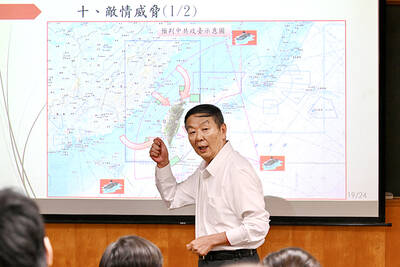US President Donald Trump’s administration is tightening rules to prevent China from obtaining advanced US technology for commercial purposes and then diverting it to military use, sources said.
Three measures agreed to by senior US officials in a meeting on Wednesday last week, but not finalized, would introduce hurdles that could be used to stop Chinese companies from buying certain optical materials, radar equipment and semiconductors, among other things, from the US.
The moves are advancing as relations between the US and China, a key customer for US technology, sour over the COVID-19 pandemic, which originated in Wuhan, China, and tit-for-tat expulsions of journalists from each country.
They are also a sign of growing nervousness within the US government over China’s “civil-military” fusion promoted by Chinese President Xi Jinping (習近平), which aims to build up its military might and supercharged technological development in tandem.
Some US officials have said that it is time to update the rules in light of the Chinese policy, as some US shipments abroad are authorized based in large part on whether they would be used for civilian or military applications.
Since “the Chinese have said to us: ‘Anything you give to us for a commercial purpose is going to be given to the military,’ what point is there in maintaining a distinction in our export control regulations?” said former White House official Tim Morrison, who was involved in drawing up the changes, which have been in the works since at least last year.
It was not clear if Trump would sign off on them, despite the decision last week to press ahead with their rollout.
Industry fears that the new rules, which include withdrawing license exceptions, could drive Chinese consumers into the arms of foreign rivals.
“There’s a chilling effect when they start taking away the availability of these license exceptions for particular exports,” Washington trade lawyer Eric McClafferty said. “It makes people more nervous to export to China.”
The White House and the US Department of Commerce did not respond to requests for comment.
“We urge the US to stop this purposeful slandering and look at China’s policy in an objective way and do more for the cooperation between our two sides,” Chinese Ministry of Foreign Affairs spokeswoman Hua Chunying (華春瑩) told a daily briefing yesterday when asked about the plans for tighter restrictions.
One change would do away with the civilian exemption, which allows for the export of certain US technology without a license, if it is for a nonmilitary entity and use, sources said.
The exception, which eases the export of items such as field-programmable gate array (FPGA) integrated circuits, would be eliminated for Chinese importers and Chinese nationals.
FPGA circuits are made by several US companies, including Intel Corp and Xilinx Inc.
“Xilinx is aware of the proposed increased export restrictions to China and is monitoring the situation closely,” a Xilinx spokesperson said in a statement.
“We will comply with any new US Department of Commerce rules and regulations if/when they are enacted,” the company said.
Intel declined to comment.
Doug Jacobson, another Washington lawyer who specializes in trade, said that several of his clients were concerned about the elimination of the civilian exemption, mainly companies involved with electronics.
“It could be significant for certain companies,” Jacobson said.
“In terms of whether that would lead to [license] denials, who knows? But it would be an additional hurdle to jump through for a US company to sell to commercial end users in China,” he said.
Another change would stop China’s military from obtaining certain items without a license even if they were buying them for civilian use, such as scientific equipment like digital oscilloscopes, airplane engines and certain types of computers.
If implemented, the measure could block certain shipments to Chinese military importers like the People’s Liberation Army, even if they said the item would be used in a hospital, for example.
A final change would force foreign companies shipping certain US goods to China to seek approval not only from their own governments, but from the US government as well.

RETHINK? The defense ministry and Navy Command Headquarters could take over the indigenous submarine project and change its production timeline, a source said Admiral Huang Shu-kuang’s (黃曙光) resignation as head of the Indigenous Submarine Program and as a member of the National Security Council could affect the production of submarines, a source said yesterday. Huang in a statement last night said he had decided to resign due to national security concerns while expressing the hope that it would put a stop to political wrangling that only undermines the advancement of the nation’s defense capabilities. Taiwan People’s Party Legislator Vivian Huang (黃珊珊) yesterday said that the admiral, her older brother, felt it was time for him to step down and that he had completed what he

Taiwan has experienced its most significant improvement in the QS World University Rankings by Subject, data provided on Sunday by international higher education analyst Quacquarelli Symonds (QS) showed. Compared with last year’s edition of the rankings, which measure academic excellence and influence, Taiwanese universities made great improvements in the H Index metric, which evaluates research productivity and its impact, with a notable 30 percent increase overall, QS said. Taiwanese universities also made notable progress in the Citations per Paper metric, which measures the impact of research, achieving a 13 percent increase. Taiwanese universities gained 10 percent in Academic Reputation, but declined 18 percent

UNDER DISCUSSION: The combatant command would integrate fast attack boat and anti-ship missile groups to defend waters closest to the coastline, a source said The military could establish a new combatant command as early as 2026, which would be tasked with defending Taiwan’s territorial waters 24 nautical miles (44.4km) from the nation’s coastline, a source familiar with the matter said yesterday. The new command, which would fall under the Naval Command Headquarters, would be led by a vice admiral and integrate existing fast attack boat and anti-ship missile groups, along with the Naval Maritime Surveillance and Reconnaissance Command, said the source, who asked to remain anonymous. It could be launched by 2026, but details are being discussed and no final timetable has been announced, the source

SHOT IN THE ARM: The new system can be integrated with Avenger and Stinger missiles to bolster regional air defense capabilities, a defense ministry report said Domestically developed Land Sword II (陸射劍二) missiles were successfully launched and hit target drones during a live-fire exercise at the Jiupeng Military Base in Pingtung County yesterday. The missiles, developed by the Chungshan Institute of Science and Technology (CSIST), were originally scheduled to launch on Tuesday last week, after the Tomb Sweeping Day holiday long weekend, but were postponed to yesterday due to weather conditions. Local residents and military enthusiasts gathered outside the base to watch the missile tests, with the first one launching at 9:10am. The Land Sword II system, which is derived from the Sky Sword II (天劍二) series, was turned